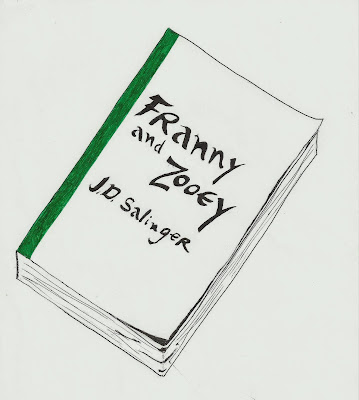Original Illustration by Stephanie Smelyansky
I read the book Franny and Zooey by J.D. Salinger a while back. You may have heard of it. If not, the book is a short story (Franny) and a novella (Zooey) published together as one volume. The book’s about Franny and Zooey, the two youngest siblings in the Glass family, which is comprised entirely of genius children. Franny and Zooey had an untraditional upbringing, mixing an education in religious philosophies with regular stints on the radio game show “It’s A Wise Child,” and they believe that’s why they have a hard time relating to other people. The plot of the novel centers on Franny’s emotional breakdown and how her brother, Zooey, tries to help her.
I’m not writing about this book to sake say that I liked it. I’m writing about this book because of the tumultuous journey the book makes you take with its characters that I think this is a journey every budding adult needs to take.
The thematic center of the book pivots around the main characters’ egos. As a result of their upbringing, both Franny and Zooey have unrealistic expectations for the world around them, but especially the naive and young Franny. When college, her passion for theater, and her love life all don’t live up to her expectations, Franny collapses. She realizes how conformist life is, proclaiming it all unoriginal, including the more esoteric bourgeois culture of which she is a member. That realization makes her lose faith in herself.
Franny may be a genius, but she’s just a twenty year old girl with the same insecurities and fears as the rest of us. All of us novice adults have hopeful misconceptions and idealistic notions of our futures. However, in the back of our heads there’s this nagging little fear reminding us that we’re bound to be disappointed, despite our attempts to ignore it. Salinger expertly forces us to confront the fear of disappointment by making the reader feel Franny’s turmoil and making the reader doubt their own character, lending to a tension that is insurmountable until the final pages of the novel. Franny’s attack at the disingenuous makes the reader fear that they themselves are an impostor, and as a budding adult, makes me feel like an actor in a world I’m not ready to handle.
As depressing as that sounds, the book’s resolution teaches both Franny and the reader a crucial lesson. Ego is defined as one’s sense of self and self-importance. If that’s so, Franny topples between two extremes: she topples faithful self-confidence and fearful uncertainty. For all of you fellow young’uns out there, there’ll be a day in your lives just like Franny’s when your entire ego is deflated by a pinprick. But as Franny learns, it’s her ego that is her savior. Franny realizes that the problem isn’t in having an ego as much as it is in projecting her ego onto other people. The message of the book essentially is know thyself, and hold thyself up to the standards thou believeth are supreme, but don’t force the same standards upon the world. At the end of the day, satisfaction results from the egotistical practice of individually living up to a personal standard, and no outside positive reaffirmation can replace that.
Ergo, love and hone your ego, as it’s all you really have. And read Franny and Zooey. You’ll learn so much more and gain so much confidence having read the book. Pinky promise.


.JPG)
.JPG)
